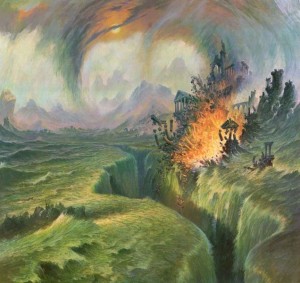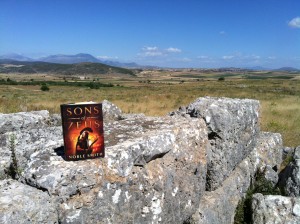[Image credit: The Fall of Númenor by Darrell K. Sweet]
I had to take a hiatus from writing my Shire Wisdom blog for about five months. I had a weird and scary thing happen to my heart (and I’ll write about that in a blog post soon). But I’m all better now, thanks to my family and the fact that I followed what I had learned while writing The Wisdom of the Shire! (Author, heal thyself!)
I was also deep into writing the second book in my Warrior Trilogy. The first book hit the stores on June 11th, and I just got back from Greece where I was finishing up research for Book 3 and meeting with my Greek publisher. You can read about my amazing trip to the very real place where my story takes place here. (I took the photo below this May at the ruins of the citadel of Plataea in Boeotia, Greece.)
A lot of people have asked me why someone like me–a lover of Tolkien and fantasy–would write a historical fiction series. What does it have to do with Tolkien? Well, reading Tolkien as a boy piqued my interest in ancient Greek mythology. I had a teacher, a priest in fact, who told me that the fall of Númenor from The Silmarillion was based on the legend of Atlantis. It intrigued me to think that Tolkien had learned a story (probably when he was very young) that grew inside him like a magic tree and evolved into something uniquely his own.
Delving into Homer for the first time (which I did so after reading my own version of the Iliad, aka The Lord of the Rings) I was struck by the similarity in the “high style” of some of Tolkien’s writing, especially the battle scenes. In fact, if you read The Letters of J.R.R. Tolkien there is this wonderful quote in Letter 142: “I was brought up in the Classics, and first discovered the sensation of literary pleasure in Homer.” –J.R.R. Tolkien, 1953
In The Wisdom of the Shire I wrote about the Greek legend of the Ring of Gyges and how this story–a ring of invisibility that brings with it a terrible curse–most likely influenced the invention of Sauron’s One Ring.
Tolkien even coined an important literary word using Greek roots: Eucatastrophe. It means “good catastrophe”–a turn of events for the protagonist where everything suddenly goes from utter crap and doom to rainbows and awesomeness (think the finale of The Return of the King and the fall of Barad-dûr).
When I was in college I started reading the ancient Greek playwrights, and then the histories of Thucydides and Herodotus. The real world of ancient Greece, especially the so-called “Golden Age” of 5th century BC Athens, started to pull me in. For years I read everything about the Greeks that I could get my hands on, scouring used bookstores for obscure tomes and scholarly treatises.
About ten years ago I was hired to write a treatment for a documentary set during the Peloponnesian War (the bloody 30-year-long battle between Sparta and Athens). While rereading Thucydides I came across a story that I had glossed over the first time I had seen it. It was the tale of an independent and democratic city-state called Plataea that was invaded in a sneak attack at the outset of the Peloponnesian War. The heroic and clever way that the Plataeans fought off the invaders, and the subsequent epic siege of their citadel (which became the longest siege in the history of the world) struck me as a story that needed to be told. And so I started working on my novel Sons of Zeus.
Ten years later that book is sitting on the shelves in bookstores and libraries around the country. And I am incredibly proud of this story of love, courage and sacrifice. I never would have written this series if I hadn’t read J.R.R. Tolkien’s works. So that’s how a fantasy author influenced me to write a work of historical fiction. And I could rewrite Tolkien’s quote about the Classics like this: “I was brought up in Middle-earth, and first discovered the sensation of literary pleasure in Tolkien.”
Sons of Zeus is available at public libraries in the US and Canada, at Amazon.com, Barnes&Noble, indie booksellers, as well as ebooks and unabridged audiobook.



Fantastic post! I always love reading about others’ experiences with (or influence by) JRR Tolkien. I’m quite certain that the main reason I enjoyed his stories so much was because of my heavy interest in the Classics as a child. I took several years of Latin throughout the course of middle and high school, and we spent a great deal of time studying Greek and Roman mythology. I can also remember being a huge fan of historical fiction in elementary school, but for some unknown reason just stopped looking for books in that genre as I got older. It wasn’t until I read Robert Harris’ “Fatherland” last year that my interest in historical (and alternate historical) fiction was renewed. So perfect timing! I am thoroughly enjoying “Sons of Zeus” and have recommended it to a number of friends already. Keep up the great work!!
Wow! Thanks, Britta. That means a lot to me that you’re enjoying Sons of Zeus. Very cool that you took Latin. That’s the foundation of all of your language skills, I’m sure. I wonder if anybody has made a list of all the languages that Tolkien could speak and read? I haven’t read Fatherland, but I saw the series with Rutger Hauer. It was pretty decent. And thanks for spreading the word about Sons of Zeus!
Yes, it must be! I’ve found my Latin studies come in very handy when trying to learn a new language – I learned some things in Latin that I never learned in English! It also taught me to be something of a translator, since that was always our homework. Unfortunately, less and less schools are offering Latin these days (below the college level, anyway), which is such a shame!
I do agree, a very insightful and love to read post! As Tolkien was inspired by Chaucer, the Father of English literature, you can say that you were inspired by the greatest English author of the 20th Century. And all of the above, including yourself, dear sir, were influenced and inspired by Greek mythology, a common denominator.
What I have loved so far, being a philologist of Greek Language myself, is the attention to detail you have given in your writings. Keeping up the good work is a pretty tiny thought to wish you for. Now, being a… Noble son of Zeus, you have already proven that idea to us, the readers. So, carry on! Can’t wait for the next instalment, so please… write faster 🙂
Thank you! And I am writing as fast as I can!!! And being a Greek philologist must be a fascinating career.
As archaeology student I really appreciated this post! I hope to find the time to read your upcoming book. We cannot thank enough Tolkien for what he let us to discover 🙂
Hey Alice! Have you been doing archaeology of the ancient world? Check out my blog about the real place behind my story Sons of Zeus and my trip to Greece: http://www.thewarriortrilogy.com/the-place
Yes, I’m going to write my bachelor thesis about Hittites, but I studied a lot about ancient Greek world. I’ll check out your blog, thank you!
The Hittites! Cool. So you must have done research in Anatolia. Have you seen this statue that was discovered in 2012? http://www.biblicalarchaeology.org/daily/news/colossal-neo-hittite-statue-discovered-at-tell-tayinat
Thank you very much Noble!
Found this cause Britta tweeted it. I confess I haven’t read your books before, but they sound intriguing. I had a Classics professor back in college, and some of the courses I took with him, each class would be about an hour of exactly what you wrote in this post! Not limited to LotR of course, but Star Wars, video games…basically studying the ancient Greek world and connecting it to the modern; an exercise in learning the similarities and influences in literature, culture, etc. Anyway, I liked that this post reminded me of that.
Even so, I have to say that Salamis remains my favorite battle of the 5th century Mediterranean world 😉
But again, Sons of Zeus sounds interesting, I will have to check it out.
Thanks for commenting. The Greeks have indeed had a profound impact on modern storytelling. Salamis was an amazing battle. The 300 sequel that’s coming out is going to take place during that battle. My book takes place about 50 years after the second Persian invasion. Definitely check out Sons of Zeus. I think you will enjoy it.
Yes, just looking at the trailers for the movie so far, it’s amazing how much the naval battle scenes look like what I’ve held in my imagination ever since reading Herodotus. Any concerns about historical inaccuracies should be easy enough to put aside if they can pull off a worthy Salamis. Looking forward to Eva Green as Artemisia as well.
None of that is to say I didn’t enjoy reading about the Peloponnesian War, but I’m pretty rusty on my Thucydides to be honest. Mostly just recall the Sicilian expedition, but that would be unrelated to your story.
Yes, I think the trireme battle in the 300 sequel looks pretty cool. And about Sicily…In book 3 of my trilogy (Sword of Apollo) there is a section that takes place in the dreaded prison pits of Syracuse, predating the imprisonment of the Athenians after the disaster of the invasion of Sicily.